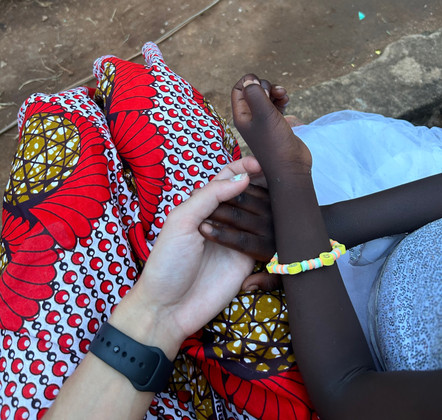My Time in Uganda: Empowering Women and Experiencing Ugandan Culture
- Feb 12, 2024
- 4 min read

When I boarded the plane that would take me to Uganda, nothing could have prepared me for what I would experience over the next few days. We arrived in Entebbe under the cover of darkness and weary from 2 days of travel, but the next morning we set off to drive up the entire country to reach our final destination: Kalongo. As we drove, my eyes were glued outside the van window, trying to take in as much as possible. I could not believe the things I was seeing: large groups of children walking the streets without parents in sight, a man taking a midday nap while balancing on his parked motorcycle, women carrying almost anything you can imagine on their heads, and cattle roaming freely everywhere. I was also astonished at the incredible beauty and vegetation of the countryside between each town we passed. Rolling hills, lush fields of trees, and breathtaking waterfalls were just a few of the natural wonders I witnessed. I could not rectify my feelings of wonder at the beauty of the people and places I saw and the heartbreak I felt from experiencing the conditions these people endure daily.
Arriving at St. Bakhita’s that night to the girls singing and dancing even in the pouring rain was one of the most joyful moments. They were so welcoming and full of joy and gratitude, which set the tone for the entirety of our stay there.

While at St. Bakhita’s, we worked with the girls to conduct ethnographic research in the surrounding community and the immersion team definitely learned a thing or two about what life is like for local community members. I visited a family in the village with a few team members from Notre Dame and some girls from the school, and while there we helped the women of the household conduct daily chores. First, we picked Bo, a local vegetable plant that the women picked from their farm earlier that morning. We learned from them that their day starts approximately at 6 in the morning, when they go out into their farm and pick the food they will prepare that day. We sat with them and picked the Bo leaves off stems for probably an hour, discussing what they thought their community needed and what daily life looks like. I could not help but let my mind wander about the reality of this family sitting under their mango tree, picking Bo for hours without the help of our team’s additional hands, day in and day out. What would life look like for this family in 5 years, or in 10? It will likely look very similar without any disruptive innovation within the area.
My visit into the community that first day allowed me to recognize the importance of our partnership with the girls of St. Bakhita’s and how far their education and business skills can take them in creating change in their communities. As we continued to interact with the girls in their school over nail painting sessions or as they styled their hair for graduation, I realized that some things are constant across cultures: love and human connection. There was nothing better than being able to laugh and tell stories with the girls, to push them to dream about crazy ideas for their future, and to learn from one another about our cultures.
Witnessing their graduation and being able to celebrate with them filled me with immense joy and hope. St. Bakhita’s is doing amazing work in educating these women, and my work in being a part of the Powerful Means Initiative is actually changing these girls' lives.
On the last day of our visit, we decided to set up tables with the girls to sell the honey that St. Bakhita’s produces on their farm, and I saw firsthand how far simple encouragement can go. The girls were a little bit shy at first with their marketing tactics, but when we pushed them to go up to customers and sell their products with pride, they began to truly shine. Not a customer walked past the tables without being approached kindly by a St. Bakhita’s girl, and one student named Susan even established a partnership with a local shop in town to make St. Bakhita’s their main supplier of honey. I witnessed this growth in just a few short hours, and I realized that with support and guidance, these girls can do powerful things for their communities and truly create lasting change.
When I reflect on my time at St. Bakhita’s, I am so incredibly grateful to have taken part in the immersion experience. I will never forget the time I spent with the girls, whether it was through interviews, exploring the town, or dancing for hours on end. They showed me the beauty of their culture and also taught me about the strength it takes to be a woman in Uganda, especially one that defies the status quo of having children and completing all household work without the help of men. Even though we visited in time for the girls to graduate, their real work begins now as they embark on their next journeys to be forces of good in Uganda. I cannot wait to see all they accomplish!
Written by Damiana Bertin, a student at the University of Notre Dame, class of 2025, studying Psychology.














